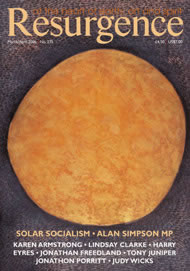IN 1962 FABER published a slim volume entitled Thom Gunn and Ted Hughes: Selected Poems, which has only recently slipped out of print. (It may yet return.) This neat little gem was the book that ignited my interest in poetry and so it naturally surfaced in my mind when I delved into Dyad, another book shared by two poets. The two differ in that the poems in the former were the heart of the matter, speaking eloquently for themselves, whereas in Dyad, though the poems clearly have their merits, it seems as though the very format, the fact of dual authorship, is the principal statement.
Dyad, it is claimed, “sketches out an ‘unbetween’ in the gaps, the echoes, the alignments and discords of two poets.” This vague abstraction sets the tone for a book which does its best to muddy waters. The prime manifestation of this is a refusal to separate the two bodies of work or to label each poem with the name of the poet who wrote it, so that the only way to discover who wrote what is to consult the index of first lines (not even of titles!) at the back. They’ve even taken the trouble to place large gaps between certain poems that seem to indicate that the poem that follows is by the other poet, when this isn’t always the case. In other words, the book is full of red herrings. Perhaps the reader is supposed to work through the whole lot without resorting to the index, but I can’t imagine anyone who could resist the temptation to peek. It is actually rather fun to find a poem that strikes you, try to guess whether it’s an Oswald or Borodale effort and then rush to the back to see whether you’ll be proved correct. I suspect, however, that such little rushes of intrigue were not the primary motivation behind the employment of this wilful obstacle.
There are plenty of positives to be found in Dyad; a number of poems and lines that reward attention. ‘Because the moon is in my mind’ by Peter Oswald is an elegant lyric almost reminiscent of Lorca, and ‘Helen’, also by Oswald, is lively, entertaining and fun, if a little long. It tells the story of the fall of Troy from the eponymous adulterer’s point of view in modern, demotic language, beginning with “I went out with this decent bloke” and finishing with “I look up into his eyes | and sincerely apologize” – a definite candidate for the best line or lines in the book. ‘Poem for my daughter Io’ (Oswald again) is another rather fine poem in which “gamblers with stars in their hands” stands out as a particularly successful image.
Sean Borodale’s work harbours great energy and abundant imagination but I find it difficult to ascertain what is being attempted. His imagery seems to me to be more about creating mood and atmosphere than evoking understandable or concrete phenomena. However, he excels at establishing a threatening, brooding, almost apocalyptic tone, and his is a strikingly original voice. Borodale empathises deeply with the plight of the natural world. The title of ‘Song for an orchard singing its death’ speaks for itself in this regard, and there are a number of poems in the book that concern a ‘Lamb of death’ (the title of another poem). There is something in the naked savagery and clear affiliation with nature that reminds me of Ted Hughes.
Dyad is an interesting and challenging volume, but I think the emphasis placed on its dual authorship and the steps taken to cloud the issue of who wrote what are ultimately distracting. It feels a little like a gimmick. Perhaps it is an attempt to draw a line in the sand between this book and the rest of modern poetry, for these two poets do not follow contemporary conventions and their poems are markedly different from those which are published in the majority of poetry magazines. They seem wilder, less intellectualised, more felt than thought. They are occasionally difficult to comprehend, but they are rarely banal, and though Borodale and Oswald lack the technique and sophistication that mainstream poets wield so lightly, there is a sense of freedom and abandon in their work that may win them admirers.
Paul Engles works at John Sandoe Books and writes and reads poetry.






